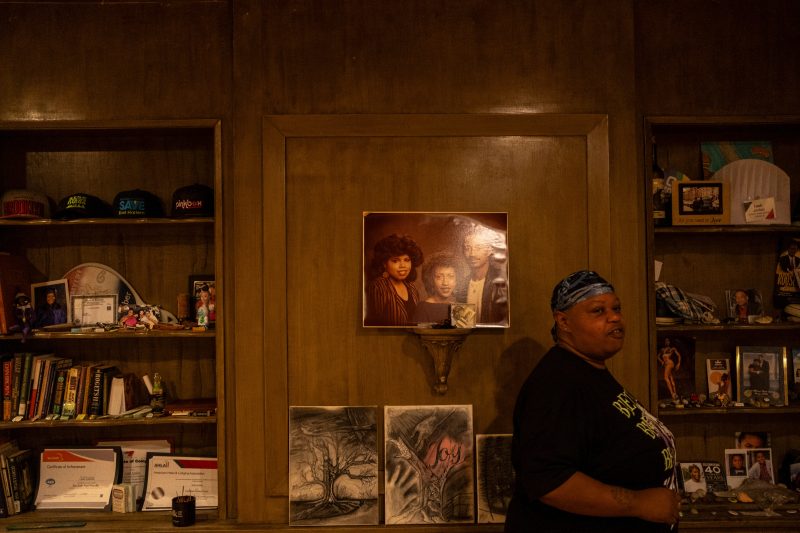CHICAGO — On the morning of her first shift serving VIP guests at the Democratic National Convention, Leah Jordan wondered: Is my milk about to spoil?
She opened her fridge and checked the expiration date. Aug. 26.
“I’m good,” she said. “I’m good for right now.”
The cook, 50, woke two hours before sunrise to get ready for a hectic Tuesday at the Marriott Marquis, where she’d be preparing bacon, eggs, biscuits, oatmeal — all the staples that she wished were easier for her to afford.
Lately, she’d been trying to make her usual gallon of Lactaid stretch for so long, the last cup or two kept going bad. Even with a full-time job she described as “amazing,” one that paid $22.75 an hour and provided health insurance, financial anxiety prodded her to play this risky game.
Monthly rent for her three-bedroom apartment on Chicago’s South Side cost $650, thanks to a generous landlord who charged below market rate. Jordan spent nearly twice that amount leasing her 2017 Ford Focus, a no-credit-check-required expense that slashed 80 minutes from a commute she’d rather not take by bus in the dark. Each trip to the grocery store, meanwhile, burned a couple hundred dollars for the single woman trying to support her 71-year-old mother.
“More than ever,” Jordan sighed.
The nation’s leaders should take bolder action to lessen such burdens, she said. Over the last four years, as the price of necessities swelled, Jordan had saved practically no money, despite making well above the state’s minimum wage. The cook had long suspected that companies hiked up prices for profit while crying inflation, though most economists argue supply-chain snags are more to blame.
A lifelong Democrat, Jordan had already planned to vote for her party’s nominee. But her excitement spiked when Vice President Kamala Harris outlined a fresh plan to outlaw corporate “price gouging” and lower the price of groceries and prescription drugs.
Many of the guests pouring into her city for the convention didn’t have to worry about living paycheck-to-paycheck, she figured, but Jordan hoped that the powerful speakers onstage this week would keep the economic message front and center.
A self-described politico and a beneficiary of Bidenomics, she had enrolled in a federally funded culinary training course when her barber income dried up during the pandemic. “That’s me!” she’d chirped when Biden mentioned apprenticeships during his speech Monday night.
Yet others watching from home, she said, might not share her enthusiasm for the party associated with the cost surge in the wake of the pandemic, even as inflation has cooled. Enthusiasm, she knew, was a tough ask for those struggling like she was.
Her workplace was one of the “official headquarters hotels,” Democratic convention organizers had announced, due to its union labor — a nod to some of the voters Harris needs to sway to win in November. Democrats were clearly trying to reach people like her, Jordan said, when the United Center erupted Monday night in prime-time chants of “Trump is a scab!”
Now it was 5:35 a.m., and she needed to hustle to the Marriott’s banquet kitchen. One of her scheduled luncheons was supposed to feed hundreds of guests. Chicago’s mayor might drop by, she heard. Maybe the Illinois governor, too.
Grabbing her black backpack, Jordan paused to consider: Is this an Alka Seltzer day? Those $3.50 tablets soothed a cough that was entering its fourth week, but they interfered with her diabetes medicine, so she downed them only on what she called “the bad days.” However, she said, they were cheaper than Coricidin, the over-the-counter drug her doctor told her was safer.
“Today is a good day,” Jordan said, closing her apartment’s steel gate.
She mentally ran through her bills as she climbed into the Ford Focus. “Trump is a scab!” chants were funny, but to her, what Harris had said at a North Carolina rally five days earlier was more rousing.
“We all know that prices went up during the pandemic when the supply chains shut down and failed,” Harris told the Raleigh crowd. “But our supply chains have now improved and prices are still too high.”
“SOVIET Style Price Controls,” Republican nominee Donald Trump had struck back. Some economists also dismissed the idea, arguing that the war in Ukraine, for instance, has lifted costs far more than what others deride as corporate “greed-flation.”
Skimming through the Harris coverage on her Android phone, Jordan had understood that criticism. But she felt relieved to hear an approach that sounded direct. The tax cuts at the heart of Trump’s economic pitch, she said, seemed tailored to boost the wealthy.
“It makes me feel like we don’t have any control,” Jordan said. “Like the government is not really in control.”
Sunlight glittered over Lake Michigan as she pulled into her employee-designated parking garage under McCormick Place, a few blocks away from her hotel. Soon politicians would fill this place.
She’d grown up rooting for the late Shirley Chisholm, the first Black congresswoman. Her relationship with patriotism, though, was complicated. Were Black women safe in her country?
“I’m not sure if the American flag represents me,” she said, passing by a banner of mini flags that someone had strung up.
Sonya Massey had needed medical care, she said, when a sheriff’s deputy shot her dead in her Springfield, Ill., kitchen two weeks before Harris became the Democratic nominee. Her own mother, who lived 45 miles away, had been diagnosed with schizophrenia. In the event of a mental health emergency, Jordan would want to beat the police there.
Now she was a 90-minute drive away, slipping into her white chef’s smock.
Jordan thought of Trump’s false comments about Harris — that his opponent “became Black” only recently — despite the fact that Harris, whose mother was Indian and father is Jamaican, had attended a historically Black university four decades ago.
It was all rooted in racism, Jordan said. The skepticism about her background. The mispronunciation of her name. The hesitation to take her ideas seriously.
The Democratic nominee, Jordan said, seemed to downplay her identity.
“Nothing new,” she said. “Dumbing down who we are to appease society.”
People wearing shirts that said “Nurses for Kamala” and “Madam President” and “Trump is a scab” crammed the Marriott’s lobby. Secret Service agents, she noticed, seemed to be everywhere.
Jordan wasn’t sure which VIP event she’d help cater or who had ordered a batch of tuna sandwiches.
She mostly looked forward to her own free lunch of broccoli cheddar soup. That was a major job perk — a meal that didn’t force her to think about her bank account.








